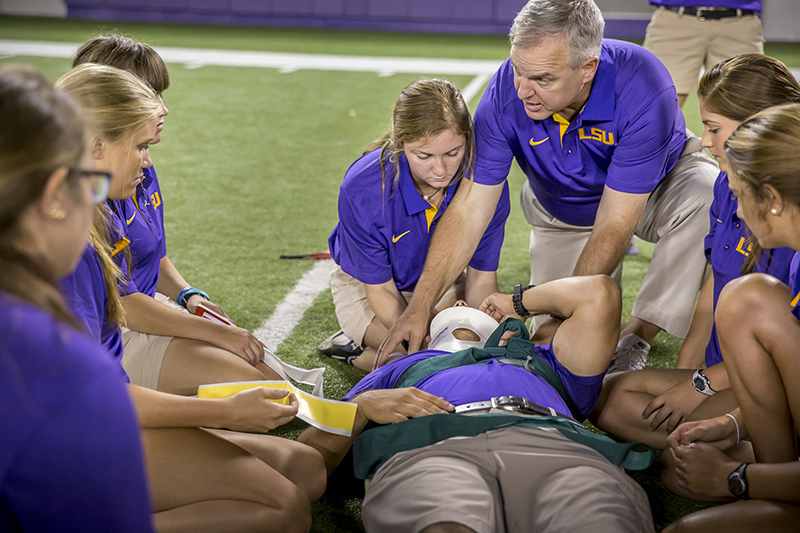Why Athletic Training?
 Q&A with Athletic Training Program Director Ray Castle
Q&A with Athletic Training Program Director Ray Castle
Why athletic training is important in today’s healthcare system
What do you think when you hear athletic training? Ray Castle, LSU Athletic Training program director, says the name comes with scores of misconceptions.
Most people think football, weightlifting, or personal training, he says, but many Athletic Training graduates never enter the sport industry. Castle reminds us that there’s more to athletic training than the name.
The Athletic Training program at LSU is a limited admissions program designed to prepare students for a successful career as a highly qualified health care professional. LSU’s Bachelor of Science in Athletic Training is accredited by the Commission on Accreditation of Athletic Training Education (CAATE). Graduates from the program establish successful careers as athletic trainers in secondary schools, colleges and universities, professional sports programs, sports medicine clinics, physician clinics, and other athletic health care settings
LSU is among the nation’s leaders in Board of Certification (BOC) Examination first-time pass rates with a three-year (2012-13, 2013-14, 2014-15) aggregate of 97+%.
What sets athletic training apart from other kinesiology programs?
Students who graduate in Athletic Training are licensed and credentialed to practice, just like any other healthcare profession. The training that these students go through sets them up to be able to enter very different patient healthcare fields. They complete three years of clinical training, which includes orthopedics, emergency medicine, primary care, nutrition and performance, enhancement, and rehabilitation.
This prepares students for so many different options, such as military, ballet, circus, corporate wellness, high school sports, and professional and college sports. Additionally, athletic trainers are specifically trained in sport medicine, which is something other professionals typically have to specialize in after formal training.
Why is the Athletic Training program at LSU distinguishable?
Athletic Training at LSU truly prepares students for jobs that require attentiveness, critical thinking, composure, and rapid decision-making. When you’re in a critical incident, such as a life-threatening incident on a soccer field or at a large-scale athletic event, such as a marathon, you have to be prepared for the emergency response. Our students are.
What is the difference between an athletic trainer and a professional in physical therapy, primary care, orthopedics, etc.?
At times it is not easy to compare one profession to the other, but the major difference is that athletic trainers work under the direction of a licensed physician and we provide pre-hospital emergency medical care. An athletic trainer is there on the spot. If an athlete or participant gets injured or becomes sick, an athletic trainer is there to evaluate the problem and tell them their best medical path. We’re there through the whole process- the diagnosis, the referral, the initial treatment, the rehabilitation, and the post-recovery performance.
What is the most important thing an athletic trainer can ask themselves?
Athletic trainers should always stay abreast of current medical practice in not just one specialty area, but multiple disciplines. Athletic trainers always need to ask themselves if they are up-to-date.
What are some careers that LSU Athletic Training students embark on after college?
Many students go work in high school sports, but we also have a lot of students work in college and professional sports, theater-related fields, private medical companies, research, and academics.
What are some community events LSU Athletic Training students can get involved in?
Students can volunteer at any public event. If an athlete or participant does become injured, the students aren’t involved with the actual medical process because they aren’t licensed yet, but they do get to experience the situation firsthand and the visual experience is great training for emergency medicine. For example, students serve as medical volunteers for the Louisiana Marathon and the Boston Marathon, which affords them an opportunity to see medical care from a large-scale perspective.
About SOK
The LSU School of Kinesiology advances the understanding of physical activity, sport, and health to optimize the quality of life for diverse populations through excellence in teaching, learning, discovery, and engagement.
Visit the School of Kinesiology at lsu.edu/kinesiology
About CHSE
The College of Human Sciences & Education (CHSE) is a nationally accredited division of Louisiana State University. The College is comprised of the School of Education, the School of Leadership and Human Resource Development, the School of Kinesiology, the School of Library and Information Science, the School of Social Work, and the University Laboratory School. These combined schools offer 8 undergraduate degree programs and 18 graduate programs, enrolling more than 1,900 undergraduate and 977 graduate students. The College is committed to achieving the highest standards in teaching, research, and service and is continually working to improve its programs.
Visit the College of Human Sciences & Education at chse.lsu.edu.